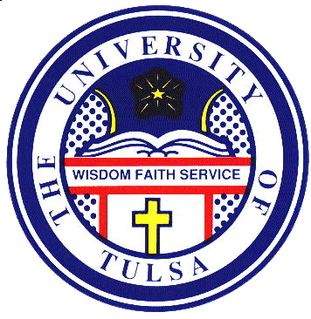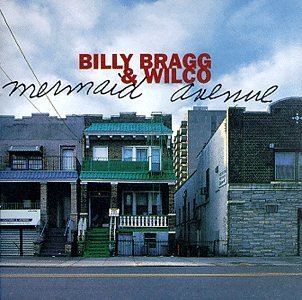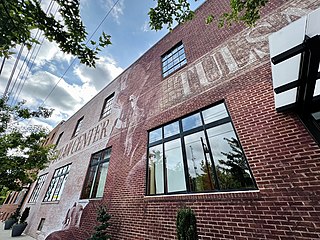Related Research Articles

The University of Tulsa (TU) is a private research university in Tulsa, Oklahoma. It has a historic affiliation with the Presbyterian Church and the campus architectural style is predominantly Collegiate Gothic. The school traces its origin to the Presbyterian School for Girls, which was established in 1882 in Muskogee, Oklahoma, then a town in Indian Territory, and which evolved into an institution of higher education named Henry Kendall College by 1894. The college moved to Tulsa, another town in the Creek Nation in 1904, before the state of Oklahoma was created. In 1920, Kendall College was renamed the University of Tulsa.

Woodrow Wilson Guthrie was an American singer-songwriter and composer who was one of the most significant figures in American folk music. His work focused on themes of American socialism and anti-fascism. He inspired several generations both politically and musically with songs such as "This Land Is Your Land".

Tulsa is the second-most populous city in the state of Oklahoma, after Oklahoma City, and is the 47th-most populous city in the United States. The population was 413,066 as of the 2020 census. It is the principal municipality of the Tulsa metropolitan area, a region with 1,034,123 residents. The city serves as the county seat of Tulsa County, the most densely populated county in Oklahoma, with urban development extending into Osage, Rogers and Wagoner counties.

"This Land Is Your Land" is a song by American folk singer Woody Guthrie. It is one of the United States' most famous folk songs. Its lyrics were written in 1940 in critical response to Irving Berlin's "God Bless America". Its melody is based on a Carter Family tune called "When the World's on Fire". When Guthrie was tired of hearing Kate Smith sing "God Bless America" on the radio in the late 1930s, he sarcastically called his song "God Blessed America for Me" before renaming it "This Land Is Your Land".
George Bruce Kaiser is an American billionaire businessman. He is the chairman of BOK Financial Corporation in Tulsa, Oklahoma. As of September 2021, he is the 476th richest person in the world and was, in 2012, one of the top 50 American philanthropists.

Mermaid Avenue is a 1998 album of previously unheard lyrics written by American folk singer Woody Guthrie, put to music written and performed by British singer Billy Bragg and the American band Wilco. The project was the first of several such projects organized by Guthrie's daughter, Nora Guthrie, original director of the Woody Guthrie Foundation and archives. Mermaid Avenue was released on the Elektra Records label on June 23, 1998. A second volume of recordings, Mermaid Avenue Vol. II, followed in 2000 and both were collected in a box set alongside volume three in 2012 as Mermaid Avenue: The Complete Sessions. The projects are named after the song "Mermaid's Avenue", written by Guthrie. This was also the name of the street in Coney Island, New York, on which Guthrie lived. According to American Songwriter Magazine, "The Mermaid Avenue project is essential for showing that Woody Guthrie could illuminate what was going on inside of him as well as he could detail the plight of his fellow man". It was voted number 939 in Colin Larkin's All Time Top 1000 Albums 3rd Edition (2000).
Steadman Upham was an American archaeologist and university administrator who served as president of Claremont Graduate University from 1998 to 2004 and the University of Tulsa (TU) from 2004 to 2016. Prior to this time, he was vice provost for research and dean of the Graduate School and professor of archaeology at the University of Oregon. Many of the students at TU fondly called him, "Uncle Stead." Upham was a widely published archaeologist, having written or edited 10 books and more than 75 book chapters and journal articles. He lectured extensively in the United States and Canada. While at TU, he held a concurrent appointment as professor in the Department of Anthropology.

Gilcrease Museum, also known as the Thomas Gilcrease Institute of American History and Art, is a museum northwest of downtown Tulsa, Oklahoma housing the world's largest, most comprehensive collection of art of the American West, as well as a growing collection of art and artifacts from Central and South America. The museum is named for Thomas Gilcrease, an oil man and avid art collector, who began the collection. He deeded the collection, as well as the building and property, to the City of Tulsa in 1958. Since July 1, 2008, Gilcrease Museum has been managed by a public-private partnership of the City of Tulsa and the University of Tulsa. The Helmerich Center for American Research at Gilcrease Museum was added in 2014 at a cost of $14 million to provide a secure archival area where researchers can access any of the more than 100,000 books, documents, maps and unpublished materials that have been acquired by the museum.
"Song to Woody" was written by American singer-songwriter Bob Dylan and released on his debut album, Bob Dylan, in 1962. The song conveys Dylan's appreciation of American folk legend Woody Guthrie. The song is one of two original compositions featured on Dylan's debut album. Dylan also rehearsed the song in a country arrangement during sessions for Self Portrait on May 1, 1970, as heard on the 2021 compilation album 1970.

The Woody Guthrie Folk Festival is held annually in mid-July to commemorate the life and music of Woody Guthrie. The festival is held on the weekend closest to July 14 - the date of Guthrie's birth - in Guthrie's hometown of Okemah, Oklahoma. Daytime main stage performances are held indoors at the Brick Street Cafe and the Crystal Theatre. Evening main stage performances are held outdoors at the Pastures of Plenty. The festival is planned and implemented annually by the Woody Guthrie Coalition, a non-profit corporation, whose goal is simply to ensure Guthrie's musical legacy. The event is made possible in part from a grant from the Oklahoma Arts Council. Mary Jo Guthrie Edgmon, Woody Guthrie's younger sister, is the festival's perennial guest of honor.

Jimmy LaFave was an American singer-songwriter and folk musician. After moving to Stillwater, Oklahoma, LaFave became a supporter of Woody Guthrie. He later became an Advisory Board member and regular performer at the annual Woody Guthrie Folk Festival.
The Woody Guthrie Foundation, founded in 1972, is a non-profit organization which formerly served as administrator and caretaker of the Woody Guthrie Archives. The Foundation was originally based in Brooklyn, New York and directed by Woody Guthrie's daughter Nora Guthrie.

Nora Lee Guthrie is the daughter of American folk musician and singer-songwriter Woody Guthrie and his second wife Marjorie Mazia Guthrie, sister of singer-songwriter Arlo Guthrie, and granddaughter of renowned Yiddish poet Aliza Greenblatt. Nora Guthrie is president of The Woody Guthrie Foundation, president of Woody Guthrie Publications and founder of the Woody Guthrie Archive, and lives in Mt. Kisco, New York.

Robert Wayne Childers was an American country-folk musician and singer-songwriter from the state of Oklahoma. Both before and after his death, he achieved widespread critical acclaim having been compared to songwriters such as Bob Dylan and Woody Guthrie. Childers is often labeled the "father", "grandfather", or "godfather" of the regional Oklahoman music scene known as Red Dirt music.
The Tulsa City-County Library (TCCL) is the major public library system in Tulsa County, Oklahoma.
The Peggy V. Helmerich Distinguished Author Award is an American literary prize awarded by the Tulsa Library Trust in Tulsa, Oklahoma. It is awarded annually to an "internationally acclaimed" author who has "written a distinguished body of work and made a major contribution to the field of literature and letters".
"Last Thoughts on Woody Guthrie" is a poem by American singer-songwriter Bob Dylan, written in honor of his idol Woody Guthrie, who at the time was dying from Huntington's disease. It was recited live during his April 12, 1963 performance at New York City's Town Hall and was officially released in 1991 on The Bootleg Series Volumes 1-3 1961-1991 after circulating on bootleg releases for years.

The Woody Guthrie Center is a public museum and archive located in Tulsa, Oklahoma that is dedicated to the life and legacy of American folk musician and singer-songwriter Woody Guthrie. The Center also contains the archives of folk singer, songwriter, and fellow social activist Phil Ochs.
This Land Sings: Inspired by the Life and Times of Woody Guthrie is a song cycle for soprano singer, baritone singer and chamber ensemble composed in 2016 by the GRAMMY Award-winning American composer Michael Daugherty. The work is an original musical tribute by Michael Daugherty to the singer-songwriter and political activist Woody Guthrie (1912–1967).

The Bob Dylan Center is a museum in Tulsa, Oklahoma, dedicated to the life and works of American singer-songwriter Bob Dylan.
References
- 1 2 Tramel, Jimmie (March 2, 2016). "Kaiser Family Foundation, TU acquire Bob Dylan Archive". Tulsa World. Retrieved March 2, 2016.
- 1 2 "The Bob Dylan Archive To Be Permanently Housed In Tulsa, Oklahoma". PR Newswire. March 2, 2016. Retrieved March 2, 2016.
- ↑ "The Collection". The Bob Dylan Archive. Retrieved 2 March 2016.
- ↑ "About the WGC Archives". Woody Guthrie Center. Retrieved 2 March 2016.